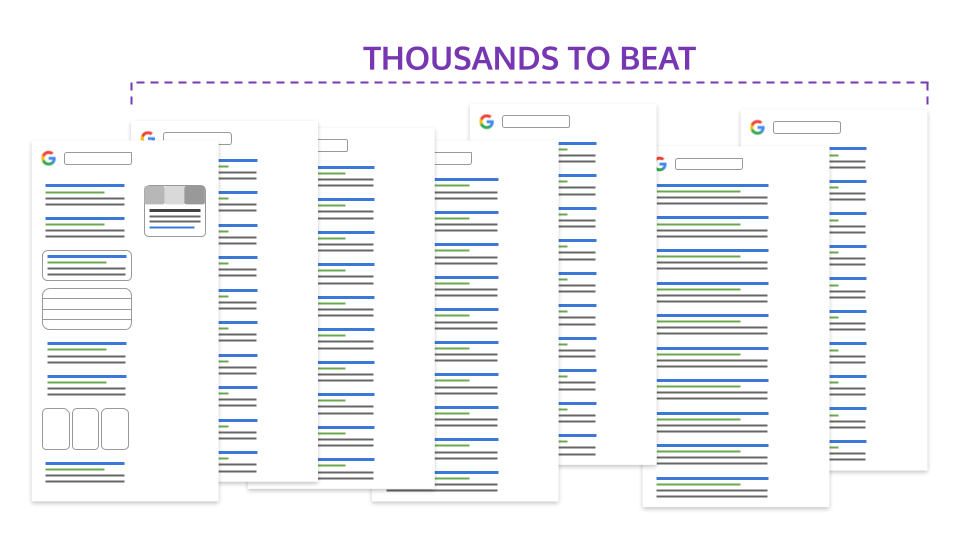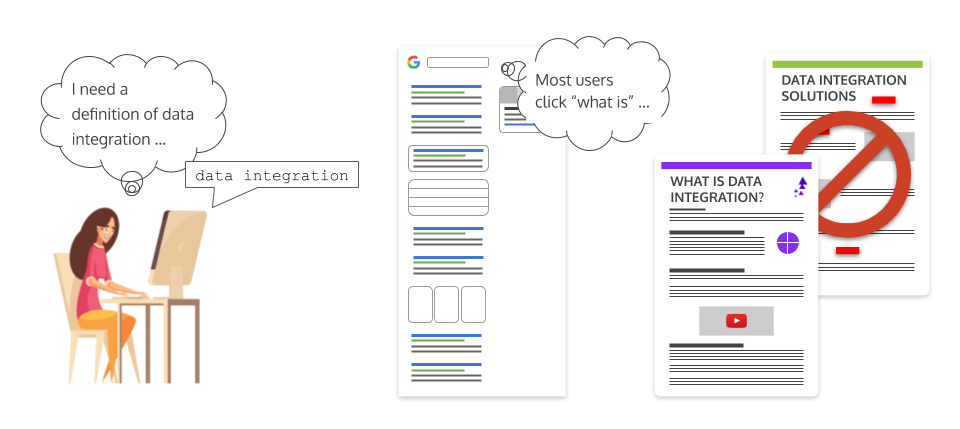SEO Keywords in a Modern Framework: Why Keyword-Based Content Doesn’t Drive Business Growth
You wrote a great piece of content, designed a good page, and made sure to put the target keyword (or a high-volume synonym or variation) in all the right places. It’s perfect.
But it’s not working.
It might be working in some regards: The existing email list loves it. Sales reps rely on it for nurturing leads. But it’s not working in organic search. It’s not ranking well or driving qualified traffic, and you can’t figure out why.
It’s because keyword-based SEO content strategies aren’t enough to drive meaningful organic traffic and create business value in the modern organic search landscape. Those strategies have over-saturated the content marketing world, were never destined to be long-term solutions, and don’t work with today’s advanced search engine algorithms.
Everybody’s Doing It
Modern SEO is a competition. Creating SEO content that wins in search and drives meaningful traffic isn’t about doing it right anymore, it’s about doing it best.
Google considers hundreds—if not thousands—of posts and pages for every query that it fields, and by now, most of them are also putting keywords in all the “right places.”
Some of that content is hand-crafted by marketers, and some of it is auto-generated by bots. Some of it uses keywords more strategically than others, but if only 100 of the 1,000+ competitors for that organic search traffic are using SEO keywords really well—yours still isn’t going to cut through.
Using the same (outdated) strategies as competitors makes your content as good as competitors. But winning in organic search requires content that’s better than competitors. You need to stand out, and you can’t rely on “putting keywords in the right places” to do that.

Keyword Optimization was Never the Answer
Traditional keyword optimization—content marketers working through a checklist of fields where the keyword should appear—was never a long-term strategy.
The end game for search engines has always been to provide the best experience, and thus the best content results, to users. For a long time, search engines relied heavily on keywords to do that, so it worked for marketers to emphasize keywords in strategic pieces of their content and pages.
But that means that keyword optimization was destined to fail, eventually, because it was never a strategy for creating excellent content. It was always a strategy for manipulating search engines.
Google no longer relies so much on keywords to measure the value of online content, so most of those keyword optimization strategies are useless. Worse, they’re wasting precious resources as your marketing team spends too much time tinkering with content in order to squeeze in another synonym or related phrase where some old-school SEO checklist says it should be.
Learn more: “SEO 101: Everything You Need to Know About Keywords” →
Use keywords and related phrases naturally and authentically, and then move on to SEO growth strategies.
Search Engines are Smarter
Modern search engines don’t need to lean into keywords so much anymore, because their machine learning and A.I. algorithms are constantly churning through petabytes of engagement data. They’re honed in on those metrics that indicate users are getting the information they need and having a good experience on your site.

New content can get Google’s attention by matching up with markers on existing content that users already prefer—and an adequate use of keywords is part of that—but after that it’s user engagement.
SEOs can no longer trick search engines into ranking content well just by putting keywords in the “right” places.
Get Beyond Keyword Optimization
Before you sit down to do keyword work on a page or blog post, stop and consider—are you trying to create better content and a better user experience, or are you trying to trick Google? If the latter, it’s time to reevaluate your SEO strategy.
Additionally, the next time an SEO consultant or agency tells you they can easily improve your organic rankings and traffic with a little keyword optimization—run away.
Instead, spend that time trying to better understand your target audience and the user needs—the underlying questions and problems—that drove them to organic search for the topic you are addressing. What are they really looking for and how can you be more helpful than the top competitors in search?
That’s an effective, modern SEO strategy. When you’re ready to get started, check out The Ultimate SEO Strategy Guide for 2020.
You can also sign up for a free demo, and I will personally walk you through what a modern SEO strategy looks like for your brand.
What's Next?
Profound Strategy is on a mission to help growth-minded marketers turn SEO back into a source of predictable, reliable, scalable business results.
Start winning in organic search and turn SEO into your most efficient marketing channel. Subscribe to updates and join the 6,000+ marketing executives and founders that are changing the way they do SEO:
And dig deeper with some of our best content, such as The CMO’s Guide to Modern SEO, Technical SEO: A Decision Maker’s Guide, and A Modern Framework for SEO Work that Matters.



![An Intro to Google Posts for B2B Marketers [Update: PDF Guide Now Available]](https://profoundstrategy.com/wp-content/uploads/cheap-seo-1030x350.jpg)


